
Wilco is an American alternative rock band based in Chicago, Illinois. The band was formed in 1994 by the remaining members of alternative country group Uncle Tupelo following singer Jay Farrar's departure. Wilco's lineup changed frequently during its first decade, with only singer Jeff Tweedy and bassist John Stirratt remaining from the original incarnation. Since early 2004, the lineup has been unchanged, consisting of Tweedy, Stirratt, guitarist Nels Cline, multi-instrumentalist Pat Sansone, keyboard player Mikael Jorgensen, and drummer Glenn Kotche. Wilco has released thirteen studio albums, a live double album, and four collaborations: three with Billy Bragg and one with the Minus 5.
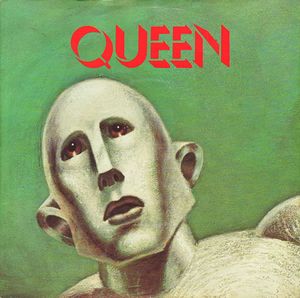
"We Are the Champions" is a song by the British rock band Queen, released from the band's sixth album News of the World (1977). Written by lead singer Freddie Mercury, it remains among rock's most recognisable anthems. The song was a worldwide success, reaching number two in the UK, number four on the Billboard Hot 100 in the US, number three in Canada, and the top ten in many other countries. In 2009 it was inducted into the Grammy Hall of Fame and was voted the world's favourite song in a 2005 Sony Ericsson world music poll.

Richard Paul Astley is an English singer who has been active in music for several decades. He gained worldwide fame in the 1980s, having multiple hits, including his signature songs "Together Forever", "Whenever You Need Somebody" and especially "Never Gonna Give You Up". He returned to music full-time in the 2000s after a 6-year hiatus. Outside his music career, Astley has occasionally worked as a radio DJ and a podcaster. By the time of his brief retirement, Astley had sold approximately 40 million records worldwide.

Sophie Michelle Ellis-Bextor is an English singer and songwriter. She first came to prominence in the late 1990s as the lead singer of the indie rock band Theaudience. After the group disbanded, Ellis-Bextor went solo and achieved success beginning in the early 2000s. Her music is a mixture of mainstream pop, disco, nu-disco, and 1980s electronic music influences.

Karl Martin Sandberg, known professionally as Max Martin, is a Swedish songwriter, record producer, and singer. He rose to prominence in the late 1990s with production credits on a string of hit singles—Britney Spears's "...Baby One More Time" (1998), the Backstreet Boys' "I Want It That Way" (1999), Céline Dion's "That's the Way It Is" (1999) and NSYNC's "It's Gonna Be Me" (2000).

"Beverly Hills" is a song by American rock band Weezer. It is the first single from the band's fifth album, Make Believe. "Beverly Hills" was released to US radio on March 28, 2005. The song features Stephanie Eitel of Agent Sparks on the chorus on backup vocals, performing the "gimme, gimme" hook.

"Thank God I Found You" is a song by American singer-songwriter Mariah Carey, featuring guest vocals from R&B singer Joe and American boy band 98 Degrees. It was released on November 15, 1999, through Columbia Records, as the second single from her seventh studio album, Rainbow (1999). Written and produced by Carey alongside Jimmy Jam and Terry Lewis, the song is a soulful pop power ballad with lyrics depicting a powerful love relationship in which the protagonist tells her lover "thank God I found you", that was inspired by a relationship Carey was going through at the time.
Shakaya are an Australian girl group formed in Cairns, Queensland in 2002 by Simone Stacey and Naomi Wenitong. The two met in 1999 while studying an Aboriginal and Torres Strait Islander music course and they had both been writing individually before they met each other. The girls were initially discovered in Cairns by Reno Nicastro and Michael Pearson-Adams. Nicastro produced most of the girls' songs and gave them free studio time for two years.
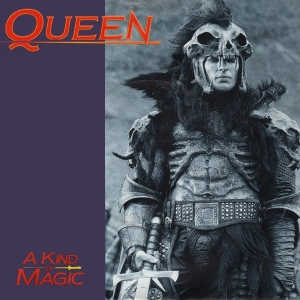
"A Kind of Magic" is the title track of the 1986 album of the same name by the British rock band Queen. It was written by the band's drummer, Roger Taylor, for the film Highlander and featured as the ending theme. The single reached number three in the UK Singles Chart, top ten in a number of European countries, and #42 on the US Billboard Hot 100. The song is the opening track on the band's compilation albums, Greatest Hits II, and Classic Queen.
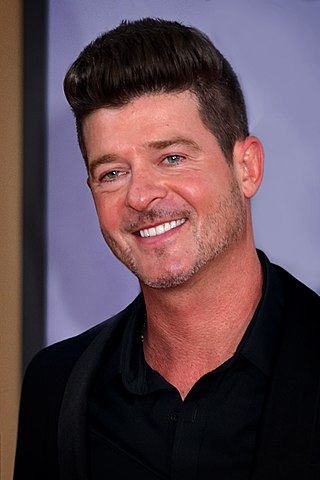
Robin Alan Thicke is an American singer, songwriter and record producer. He is best known for his 2013 hit single "Blurred Lines", which is one of the best-selling singles of all time. At the 56th Annual Grammy Awards, he received nominations for Record of the Year and Best Pop Duo/Group Performance.

"Sometimes You Can't Make It on Your Own" is a song by Irish rock band U2. It is the third track on their eleventh studio album, How to Dismantle an Atomic Bomb (2004), and was released as the album's second single worldwide except in North America on 7 February 2005. Originally titled "Tough", the song is lyrically about the relationship between the band's lead vocalist Bono and his father Bob Hewson, who died of cancer in 2001.

"Santa Baby" is a song performed by American singer Eartha Kitt with Henri René and His Orchestra and originally released in 1953. The song was written by Joan Javits and Philip Springer, who also used the pseudonym Tony Springer in an attempt to speed up the song's publishing process. Lyrically, the song is a tongue-in-cheek look at a Christmas list addressed to Santa Claus by a woman who wants extravagant gifts such as sables, yachts, and decorations from Tiffany.

James Morrison Catchpole is an English singer, songwriter and guitarist. In 2006, his debut single "You Give Me Something" became a hit in Europe, Australia, Japan and Iran, peaking in the top five in the UK and claiming the number one spot in New Zealand. It preceded the release of his debut album Undiscovered (2006), which was released through Polydor Records and debuted atop the UK Albums Chart. In 2007, Morrison won the Brit Award for Best British Male.
"Couch Potato" is a parody song by American satirist "Weird Al" Yankovic. It is a parody of the Academy Award winning song "Lose Yourself" by Eminem. In it, the narrator details his obsession with watching television and the television shows he watches.
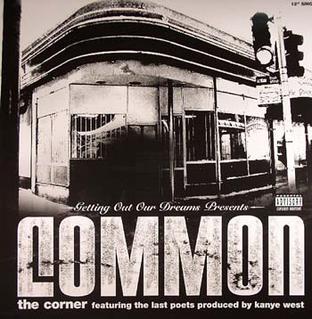
"The Corner" is the second single released by rapper Common on his sixth album, Be. It features a chorus and production by Kanye West as well as spoken word lyrics by The Last Poets. The song's lyrics deal with street corners in poor neighborhoods. The song's beat contains samples from "You Make the Sun Shine" by The Temprees and "What It Is" by The Temptations. Because of the song's gritty sound, some fans considered it to be a return to Common's Resurrection days. A music video directed by Kanye West was made for "The Corner."

"Make You Feel My Love", also known as "To Make You Feel My Love", is a song written by Bob Dylan for his album Time Out of Mind, released in September 1997. It was first released commercially in August 1997 by Billy Joel for his compilation album Greatest Hits Volume III.
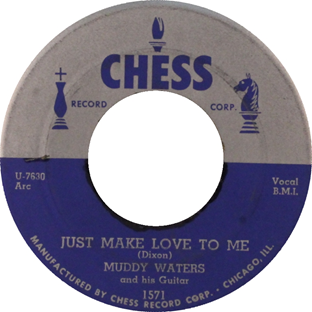
"I Just Want to Make Love to You" is a blues song written by Willie Dixon. In 1954, it was recorded by Muddy Waters, and released as a single with the title "Just Make Love to Me". The song reached number four on Billboard magazine's R&B Best Sellers chart.

"Make Me Better" is the third single from Fabolous' album From Nothin' to Somethin'. The song features Ne-Yo on the hook and is produced by Timbaland.

"(You Want to) Make a Memory" is a song by American rock band Bon Jovi, which was released as the first single from their tenth studio album Lost Highway (2007). Written by Jon Bon Jovi, Richie Sambora and Desmond Child, it was released for radio airplay on March 20, 2007, and for download on the US iTunes Store on April 17, 2007. The song is a ballad, and was performed at several nationally-televised events in an effort to promote the single. "(You Want to) Make a Memory" peaked at number 27 in the United States, making it Bon Jovi's last single to break the Top 40 on the Hot 100.
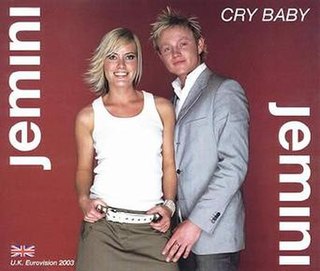
"Cry Baby", written and composed by Martin Isherwood, was the United Kingdom's entry at the Eurovision Song Contest 2003, performed by the duo Jemini. It was the first of two songs entered by the United Kingdom to earn no points from any other countries. It was also the first ever English-language song to receive no points.
















